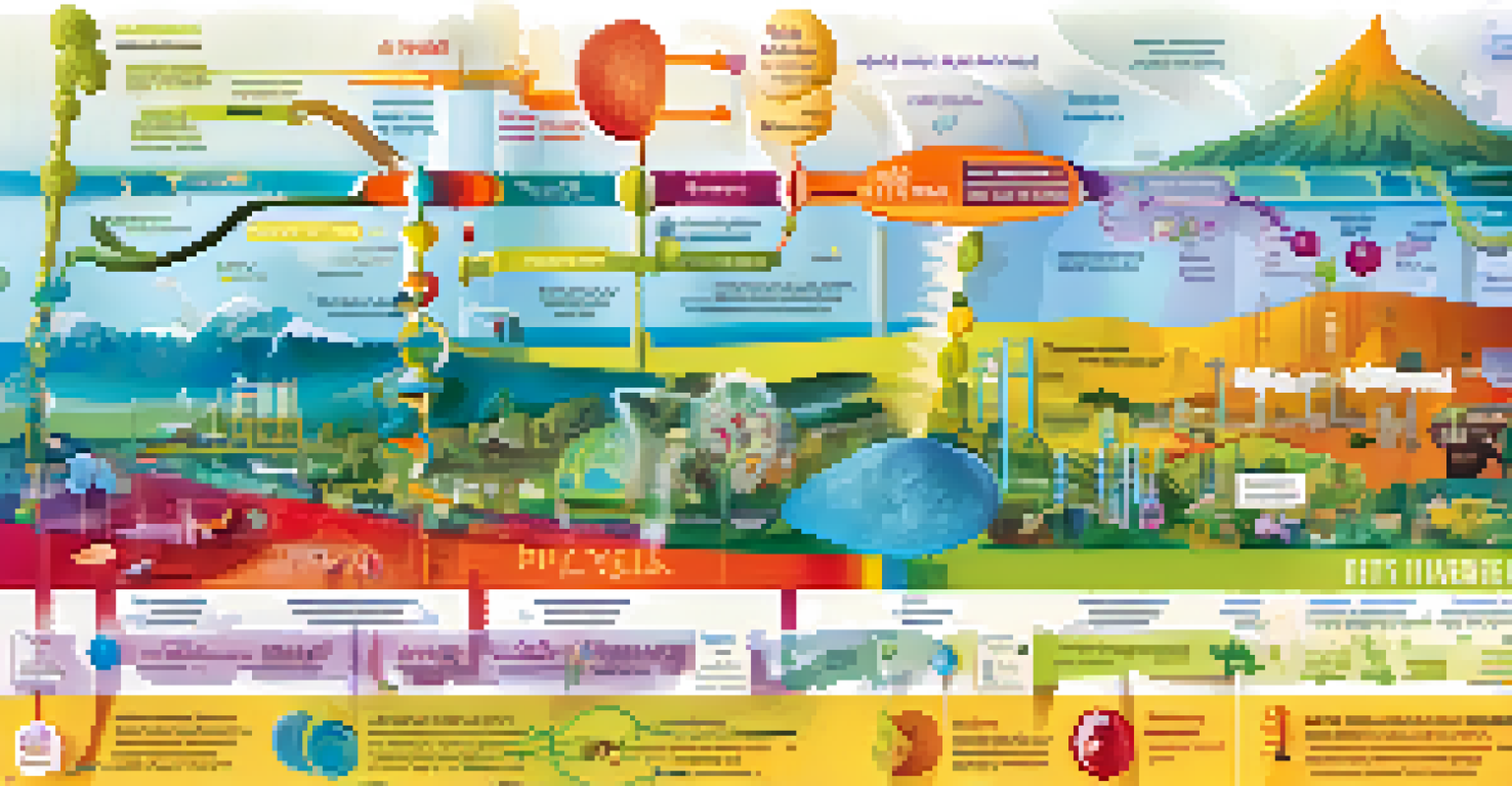Environmental Factors in Precision Medicine: A Comprehensive View

Understanding Precision Medicine and Its Importance
Precision medicine is a tailored approach to healthcare, focusing on individual differences in genetics, environment, and lifestyle. Unlike traditional medicine, which often uses a one-size-fits-all method, precision medicine seeks to provide personalized treatment plans. This approach is especially relevant in managing complex diseases where genetic and environmental factors play a significant role.
Precision medicine is about treating individuals based on their unique characteristics rather than a one-size-fits-all approach.
The importance of precision medicine lies in its potential to improve patient outcomes by considering the unique circumstances of each individual. For instance, two patients with the same condition may respond differently to the same treatment based on their genetic makeup or environmental exposures. By understanding these nuances, healthcare providers can better target therapies and interventions.
As we delve deeper into precision medicine, it becomes clear that environmental factors are critical components that can influence health outcomes. These factors can range from pollution levels to dietary habits, and they often interact with genetic predispositions in complex ways, making their study essential for effective treatment strategies.
Key Environmental Factors Influencing Health Outcomes
Environmental factors encompass a wide range of elements, including physical, chemical, and social influences. For example, exposure to air pollutants is linked to respiratory diseases, while socioeconomic status can affect access to healthcare and healthy food options. Understanding these factors is crucial for developing comprehensive treatment plans in precision medicine.

Another important aspect is the role of lifestyle choices, such as diet, exercise, and stress management. These choices can significantly impact an individual's risk for diseases such as diabetes and heart disease. By incorporating lifestyle modifications into treatment plans, healthcare providers can enhance the effectiveness of precision medicine.
Precision Medicine Personalizes Care
This approach tailors treatment plans based on individual genetic, environmental, and lifestyle factors to improve patient outcomes.
Additionally, the built environment, including housing quality and neighborhood resources, can shape health outcomes. For instance, living in a community with access to parks and recreational facilities encourages physical activity, which is vital for maintaining health. Recognizing these environmental influences allows for a holistic approach in precision medicine.
The Interplay Between Genetics and Environment
The relationship between genetics and environmental factors is like a dance, where each partner influences the other's movements. For example, a person may have a genetic predisposition to a certain condition, but environmental triggers, such as diet or exposure to toxins, can determine whether that condition manifests. This interplay is a key area of research in precision medicine.
The environment is the silent partner in the health of individuals and communities; it plays a crucial role in determining health outcomes.
A classic example is the case of certain cancers, where specific genetic mutations may increase risk, but lifestyle choices and environmental exposures can further amplify that risk. This understanding helps clinicians tailor prevention strategies based on an individual's genetic makeup and environmental context, thereby enhancing the efficacy of interventions.
Moreover, advances in technology, such as genomic sequencing, allow us to better understand the interactions between genes and the environment. This information can lead to more personalized treatment options, making it easier to target therapies that consider both genetic and environmental factors.
Case Studies Highlighting Environmental Influences
Real-world examples can illuminate the impact of environmental factors on health. One case study involves a cohort of patients living in urban areas with high air pollution levels, who showed increased rates of asthma and other respiratory conditions. By addressing the environmental issue of pollution, healthcare providers could implement strategies that significantly improved patient health outcomes.
Another illustrative case is found in agricultural communities, where exposure to pesticides has been linked to various health issues, including neurological disorders. In this scenario, precision medicine could guide efforts to reduce exposure and provide targeted therapies based on individual risk factors, showcasing the importance of considering environmental influences.
Environmental Factors Matter
Elements like pollution, lifestyle choices, and socioeconomic status significantly influence health outcomes and should be integrated into treatment strategies.
These case studies underscore the necessity of integrating environmental assessments into precision medicine. By recognizing and addressing these influences, healthcare professionals can devise more effective, personalized treatment plans that ultimately lead to better health outcomes.
The Role of Social Determinants in Health
Social determinants of health (SDOH) are the conditions in which people are born, grow, live, work, and age. These factors can have profound effects on health outcomes, making them vital to consider in precision medicine. For instance, individuals in low-income neighborhoods may face barriers to accessing nutritious food and quality healthcare.
Research has shown that SDOH can influence chronic disease prevalence and management. By recognizing the significance of these social factors, healthcare providers can work to address disparities and tailor interventions that consider not just biological, but also social contexts.
Incorporating SDOH into precision medicine can lead to more comprehensive care. For example, a patient with diabetes may benefit from not only medication but also community resources that support healthy eating and physical activity. This holistic approach can significantly enhance patient engagement and health outcomes.
Technological Advancements Supporting Environmental Research
Technology plays a pivotal role in advancing our understanding of environmental factors in precision medicine. Tools such as geographic information systems (GIS) allow researchers to map environmental exposures and correlate them with health outcomes. This data-driven approach helps identify at-risk populations based on their environmental context.
Wearable technology, such as fitness trackers and health monitoring devices, also provides valuable insights into individual behaviors and environmental interactions. Such tools can collect data on physical activity levels, sleep patterns, and even exposure to pollutants, enabling personalized feedback and interventions.
Technology Enhances Healthcare Insights
Advancements in technology, such as GIS and wearable devices, facilitate a deeper understanding of environmental impacts on health, enabling personalized interventions.
Moreover, advancements in data analytics and artificial intelligence are revolutionizing how we process and interpret vast amounts of health and environmental data. These technologies facilitate the development of predictive models that can guide healthcare professionals in making more informed decisions tailored to individual patients.
Future Directions for Integrating Environmental Factors
Looking ahead, the integration of environmental factors into precision medicine is poised to grow, fueled by ongoing research and technological advancements. As we continue to uncover the complexities of how environment and health interact, it will become increasingly essential to incorporate these findings into clinical practice. This could lead to more effective preventive strategies and treatment plans that truly reflect the individual needs of patients.
Collaboration between various sectors, including healthcare, environmental science, and public policy, will be crucial in shaping the future of precision medicine. By working together, these fields can develop comprehensive frameworks that address both health and environmental issues, leading to improved health equity.

Ultimately, the goal is to create a healthcare system that is not only responsive to individual genetic profiles but also attuned to the environmental factors that impact health. This holistic approach will pave the way for more personalized, effective, and equitable healthcare solutions.